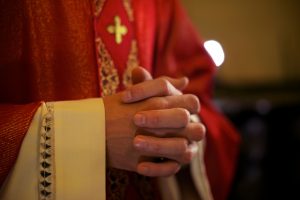Are Faith Leaders Trained to Talk to About End-of-Life Topics?

My wife and I are over 65, and are both ready to discuss the topic of death and end-of-life planning. We spoke about it amongst ourselves, but need some guidance. We are religious, and would like our religious leader’s advice in this area before we make any decisions, but are concerned that he may not be trained to discuss the medical aspects of end-of-life topics, and may only be trained to provide a religious perspective. We hope he can lead us in the right direction, but may need more than he can provide. Since they often sit with those who are sick, and pray for them, do you know if clergy members are typically trained in end-of-life topics? Thank you in advance for your guidance.
What will be most important to you at the end of your life? It’s a tough question, and one that many of us avoid discussing. You and your husband, however, are wise in your intent to address it with someone you rely on for advice, such as your pastor. Your concern about whether clergy members are experienced in discussing these topics is a good one, however. Let’s explore what is happening with faith leaders in their experience with discussing death and dying.
Training on End-of-Life Topics for Religious Leaders is Much Needed
Confronting sickness and death is part of a faith leader’s job description. We often see members of the clergy sitting with congregants during chemotherapy treatments and other life or death medical situations, and praying with them in the midst of pain. Faith leaders often prepare for this work at school, spending a semester working as a hospital chaplain or volunteering at a nursing home. However, some still enter professional ministry unprepared to sit at someone’s bedside and offer advice, according to recent research on religion and end-of-life care.
The research included two new studies, which are both part of Harvard University’s “National Clergy Project for End-of-life Care,” and the findings were that many clergy are both ill-prepared and reluctant to fully engage in end-of-life conversations with congregation members and their families.
One of the studies was a national survey of more than 1,000 clergy. The other involved in-depth interviews with 35 ministers from five states. The research raises four critical areas of concern:
- Too much faith in miracles: More than 3 in 10 clergy said they would strongly agree with a congregant who said, “I believe God will cure me of this cancer.” Only 18% affirmed the belief that every medical treatment should be accepted “because my faith says to do everything I can to stay alive.”
- Lack of knowledge: Spiritual leaders showed little knowledge of end-of-life care, including the benefits of palliative care and potential harms associated with invasive interventions. “Many grossly overestimated the benefits of aggressive medical procedures at the end-of-life,” researchers reported in the Journal of Palliative Medicine. Three-quarters said they would like more training in end-of-life issues.
- Fear of overstepping boundaries: The default position of many clergy, even those who personally believed it was against God’s will to suffer unnecessarily, was to merely support the decisions of dying congregants and their family members.
- Conflicting principles: Spiritual principles, such as the sacredness of life and the capacity for divine healing may come into conflict with other religious principles to comfort the suffering and place faith that God will care for individuals after this life.
The study found that some religious leaders do not offer guidance out of respect for the “free will” of congregants, but researchers indicated a lack of knowledge of the medical consequences also played a role.
Around 3 in 4 faith leaders are open to training on end-of-life care, the research showed. For those who are willing to discuss end-of-life topics, The Clergy Project program leaders are working on a free end-of-life care curriculum to empower faith leaders, highlighting the important role religion often plays at the end of people’s lives. “What clergy say — and what they do not say — can make a major difference in whether believers experience a ‘good death,’” the Association of Religion Data Archives reported in its overview of the research.
Be sure to check with your religious leader to see if he or she feels comfortable sitting down with you and your husband to discuss your end-of-life wishes.
Medicare Recipients Can Consult a Doctor on End-of-life Topics at No-Cost
Whether or not you meet with your pastor, it is a smart idea to take advantage of Medicare’s coverage of end-of-life discussions with a doctor, as well. Last year, in the first year end-of-life conversations with doctors were covered by Medicare, 14,000 providers billed almost $35 million — including nearly $16 million paid by Medicare — for advance care planning conversations for about 223,000 patients from January through June.
The rule requires no specific diagnosis and sets no guidelines for the end-of-life discussions. Conversations center on medical directives and treatment preferences, including hospice enrollment and the desire for care if patients lose the ability to make their own decisions. The conversations may occur during annual wellness exams, in separate office visits or in hospitals. Nurse practitioners and physicians’ assistants may also seek payment for end-of-life talks.
Make sure your end-of-life plans are followed with an Advance Medical Directive
It is commendable that you are taking the steps to discuss your end-of-life planning. After doing so, it’s a good time to make sure your wishes are spelled out and available for your loved ones in your legal documents. If you have not done Long-Term Care Planning, Estate Planning, and Incapacity Planning (or had your Planning documents reviewed in the past several years), or if you have a loved one who is nearing the need for long-term care or already receiving long-term care, call us to make an appointment for a no-cost consultation:
Fairfax Elder Law: 703-691-1888
Fredericksburg Elder Law: 540-479-1435
Rockville Elder Law: 301-519-8041
DC Elder Law: 202-587-2797